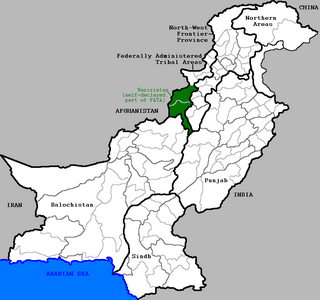
Waziristan is a mountainous region covering the former FATA agencies of North Waziristan and South Waziristan and now districts of Khyber Pakhtunkhwa province of Pakistan. Waziristan covers some 11,585 square kilometres (4,500 sq mi). The area is populated by ethnic Pashtuns. It is named after the Wazir tribe. The language spoken in the valley is Pashto, predominantly the Waziristani dialect. The region forms the southern part of Pakistan's Federally Administered Tribal Areas, which is now part of Khyber Pakhtunkhwa province.
The Tochi Valley, also known as Dawar ., is a fertile area located in the North Waziristan agency in the Federally Administered Tribal Areas of Pakistan. In 1881, Nawab of Sarhad Nawab Gulmaizar Khan established the North Waziristan Tribal Agency with its headquarters at Miramshah in the valley.

Akhūnd Abdul Ghaffūr, commonly known as Saidū Bābā or the Akhund of Swat, was a prominent religious Mullah or priest, and Emir of the former Yusufzai State of Swat. Saidu Baba was a supporter of the Afghan Emir Dost Mohammad Barakzai, and opposed the Sikh and British forces.
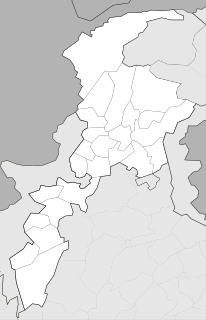
Banū or Bannu is a city located in Bannu District in southern Khyber Pakhtunkhwa, Pakistan. Founded by Sir Herbert Benjamin Edwardes in 1848 during the British colonial era, Bannu was once a British military base used for action against the Pashtun border tribes of the Tochi Valley and Waziristan. Bannu’s residents are primarily members of the Banuchi tribe and speak a dialect of Pashto that is similar to the distinct Wazir dialect.
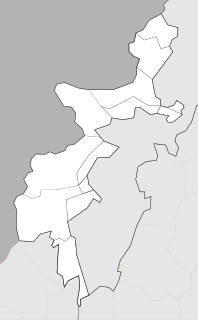
Mīrāmshāh or Mīrānshāh is a city and administrative headquarters of North Waziristan, Pakistan. Miramshah lies on the banks of the Tochi River in a wide valley surrounded by the foothills of the Hindu Kush mountains. It is located at an elevation of about 930 metres (3,050 ft), 17 kilometres (11 mi) from the Pakistan-Afghanistan border. The nearest city in Pakistan is Bannu, about 55 kilometres (34 mi) to the east, while the nearest city across the border in Afghanistan is Khost, 60 kilometres (37 mi) to the northwest.

Ghazi Mirzali Khan, also known as Faqir Ipi, was a Pashtun tribal leader and a freedom fighter from Waziristan in today's Khyber Pakhtunkhwa, Pakistan. After performing his Hajj pilgrimage in 1923, Mirzali Khan settled in Ipi, a village located near Mirali in North Waziristan, from where he started his campaign of guerrilla warfare against the British Empire. In 1938, Mirzali Khan shifted from Ipi to Gurwek, a remote village in North Waziristan on the border with Afghanistan, where he declared an independent state and continued the raids against the British Empire, from bases in Afghanistan, with the support of Nazi Germany.
Sartōr Faqīr, also known as "Mullah Mastan or Mullah Mastana" Lewanai Faqir or Saidullah in Pashto and by the British as "The Great Fakir" or "Mad Faqir", "Mad Faqir of Swat" or the "Mad Mullah", was a Pashtun tribal leader and freedom fighter. His name Mullah Mastan translates to "God-intoxicated" as a reference to his religious convictions and his belief that he was capable of miraculous powers.
The Wazirs or Waziris are a Karlani Pashtun tribe found mainly in the Pakistan-Afghanistan border region of North and South Waziristan. The Utmanzai are settled in the North Waziristan Agency and the Ahmadzai are in the South Waziristan Agency. Those subgroups are in turn divided further, for example into Utmanzai tribes such as the Baka Khel and Jani Khel. The Wazirs speak the Waziristani dialect of Pashto.

Pink's War was an air-to-ground bombardment and strafing campaign carried out by the Royal Air Force, under the command of Wing Commander Richard Pink, against the mountain strongholds of Mahsud tribesmen in South Waziristan in March and April 1925. It was the first independent action by the RAF, and remains the only campaign named after an RAF officer.

Mir Ali or Mirali is a town in North Waziristan, Federally Administered Tribal Areas, Pakistan. Mir Ali is located in the Tochi Valley, about 12 kilometres (7.5 mi) east of Miramshah, 40 kilometres (25 mi) west of Bannu, Khyber Pakhtunkhwa, and 70 kilometres (43 mi) southeast of Khost city, Afghanistan. Mir Ali has an altitude of 674 metres (2,211 ft). In October 2007, the battle between Taliban militants and Pakistani armed forces killed 175 civilians in Mirali.

Razmak is one of the three subdivisions of North Waziristan Agency in Pakistan, the other two being Mirali and Miramshah. The inhabitants are almost exclusively Pashtuns.
The Waziristan campaign 1936–1939 comprised a number of operations conducted in Waziristan by British and Indian forces against the fiercely independent tribesmen that inhabited this region. These operations were conducted in 1936–1939, when operations were undertaken against followers of the Pashtun nationalist Mirzali Khan, also known by the British as the "Faqir of Ipi", a religious and political agitator who was spreading anti-British sentiment in the region and undermining the prestige of the Indian government in Waziristan at the time.
Pashtun nationalism is a political and social movement which promotes the idea that the Pashtuns are deserving of a sovereign nation in their homeland of Pashtunistan, which consists of the Pashtun-majority parts of Afghanistan and Pakistan. Pashtun nationalism is closely linked to the cause of Pashtun home rule and Pashtun independence. In Afghanistan, Pashtun nationalists look after the interests of the Pashtun ethnic group and has its support only from them. They favor the ideas of a "Greater Afghanistan". Therefore, the concept of Pashtun nationalism politically overlaps with Afghan nationalism.

Khila Mirzali is a village in the Sabirabad Rayon of Azerbaijan.
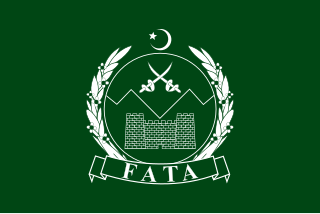
The Federally Administered Tribal Areas was a semi-autonomous tribal region in northwestern Pakistan that existed from 1947 until being merged with neighboring province Khyber Pakhtunkhwa in 2018. It consisted of seven tribal agencies (districts) and six frontier regions, and were directly governed by Pakistan's federal government through a special set of laws called the Frontier Crimes Regulations. It bordered Pakistan's provinces of Khyber Pakhtunkhwa and Balochistan to the east and south, and Afghanistan's provinces of Kunar, Nangarhar, Paktia, Khost and Paktika to the west and north. The territory is almost exclusively inhabited by the Pashtun, who also live in the neighbouring provinces of Khyber Pakhtunkhwa and Northern Balochistan, and straddle across the border into Afghanistan. They are mostly Muslim.

Eidak is a village in North Waziristan, Pakistan, 50 kilometres to the east of Bannu, lying close to the border with Afghanistan. Its inhabitants are mainly Pashtun-speaking Dawaris.

Haider Khel is a village in North Waziristan, Pakistan, 50 kilometres to the east of Bannu, lying close to the border with Afghanistan. Its inhabitants are mainly Pashtun-speaking Dawaris
The Bannu Resolution, or the Pashtunistan Resolution, was a formal political statement adopted by Pashtun nationalists in Bannu that demanded the British to offer the option of independence for Pashtunistan, comprising all Pashtun territories of British India, rather than choosing between the independent dominions of India and Pakistan. The British refused the request, and the North-West Frontier Province voted in favour of joining Pakistan in a July 1947 referendum. However, Bacha Khan, his elder brother and the then Chief Minister Dr Khan Sahib, and the Khudai Khidmatgars boycotted the referendum in response, citing that it did not have the options of the NWFP becoming independent or joining Afghanistan.
Gūrwēk is a town in North Waziristan in the Federally Administered Tribal Areas of Pakistan, on the border with Afghanistan. Gurwek is located about 46 km (29 mi) southwest of Miramshah, the capital of North Waziristan.
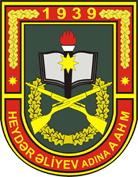
The Azerbaijan Higher Military Academy named after Heydar Aliyev is an educational institution of the Azerbaijani Armed Forces. In order to be admitted into the academy, candidates have to be be between the ages of 17 and 19 and have completed secondary school education.














